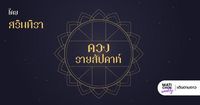The Thai New Year, known as Songkran, is not just a time for celebration but also a period steeped in tradition and cultural significance. From April 13 to April 15 each year, families come together to pay respects to their elders and engage in rituals that reflect their gratitude and love. One of the most cherished customs during this time is the foot-washing ceremony, where children wash their parents' feet as a gesture of respect and a way to seek forgiveness for any past misdeeds.
This year, as families prepare for Songkran, the foot-washing ritual remains a focal point, symbolizing the deep-rooted Thai values of filial piety and respect for one's parents. The ceremony is believed to cleanse not only the physical body but also the spirit, allowing individuals to start the New Year with a clean slate.
According to Thai customs, the act of washing a parent's feet is an expression of gratitude and an acknowledgment of the sacrifices made by parents throughout their lives. It is a moment for reflection and connection, emphasizing the importance of family bonds. In modern times, while the traditional rituals may have evolved, the essence of these practices continues to resonate within Thai society.
As families gather to perform this ritual, they often prepare a special setup that includes a basin filled with warm water, fragrant flowers, and offerings to enhance the experience. The water used for washing is sometimes infused with jasmine and other aromatic elements, symbolizing purity and love. This practice not only honors the parents but also serves to strengthen family ties, creating lasting memories.
In recent years, the influence of social media has played a significant role in revitalizing interest in traditional customs. Many families share their foot-washing ceremonies online, inspiring others to partake in the tradition. Influencers and public figures often post heartfelt messages alongside images of the ritual, reinforcing the values of gratitude and respect. As one popular Thai influencer noted, "Thank you for your endless love and forgiveness," capturing the spirit of the occasion.
However, the celebration of Songkran and the foot-washing ceremony is not without its challenges. As urbanization and modern lifestyles change the way families interact, some may find it difficult to maintain these traditions. Nevertheless, many still find ways to adapt the rituals to fit contemporary life, whether through simple family gatherings or community events.
For those who have lost their parents, the foot-washing ceremony takes on a different meaning. Many choose to honor their memory by performing the ritual in spirit, reflecting on their teachings and the values instilled in them. This adaptability highlights the resilience of Thai culture and the enduring importance of family connections.
In preparing for the foot-washing ceremony, families typically gather the necessary items: a clean basin or container, warm water mixed with fragrant oils, flowers such as jasmine or marigolds, and sometimes even small gifts for their parents. The setting is often a quiet and clean area of the home, where the parents can sit comfortably while their children perform the ritual.
The ceremony begins with a respectful greeting and the lighting of incense, followed by a heartfelt apology for any past wrongs. The child then gently washes the feet of their parents, expressing their love and gratitude. Afterward, it is customary for the parents to offer blessings, wishing their children prosperity and happiness in the coming year.
As families partake in this meaningful tradition, it serves as a reminder of the values of humility and forgiveness—qualities that are increasingly vital in today's fast-paced world. The act of washing a parent's feet is not merely a ritual; it is a profound expression of love that transcends generations.
In conclusion, the foot-washing ceremony during Songkran encapsulates the essence of Thai culture—a blend of respect, gratitude, and the importance of family. As Thailand embraces modernity, the enduring practice of honoring parents through this beautiful ritual continues to thrive, ensuring that the bonds of family remain strong amidst the changing tides of society.



